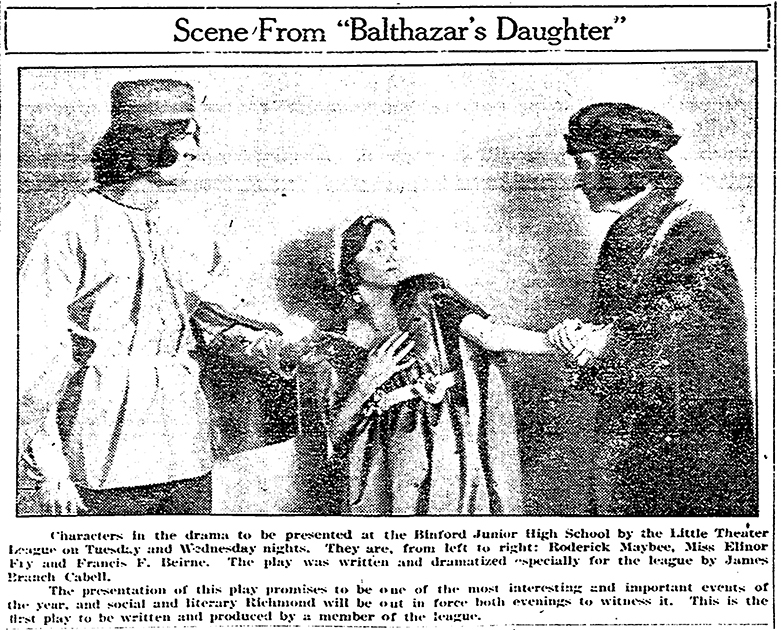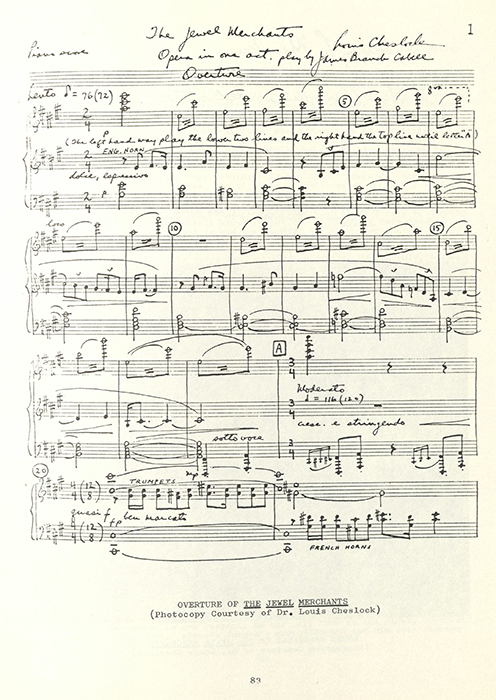
Richmond Times-Dispatch, February 20, 1921, p. 26.
Like many authors, James Branch Cabell was interested in disseminating his stories through adaptation to other media. Today’s authors tend to explore film adaptations and optioning, but in Cabell’s day radio and theater plays were more likely avenues. Cabell himself tried a hand at drama with Balthazar’s Daughter (pictured above) and Simon’s Hour. According to Edgar MacDonald, Cabell also approved a Yiddish dramatization of Jurgen (MacDonald, p. 273).
The James Branch Cabell Collection (M 214) at VCU Libraries Special Collections and Archives include copies of a number of adaptations and artistic interpretations of James Branch Cabell’s works. Among this group of materials are program notes for performances of Deems Taylor’s symphonic interpretation of Jurgen.
Of special note is a screenplay by Sidney Howard and Barrett H. Clark. Sidney Howard worked in Hollywood for MGM, and adapted three works by Sinclair Lewis, one of Cabell’s friends. Howard won the 1925 Pulitzer Prize for Drama, and a posthumous Academy Award in 1940 for his screenplay for Gone With the Wind. A typescript of the Howard/Clark screenplay with additions and corrections may be found in the Sidney Coe Howard papers, 1903-1939 held by the Bancroft Library at UC Berkeley. Bound with the screenplay is the manuscript of “Patricia,” a comedy by Clark, suggested by an episode in Cabell’s The Rivet in Grandfather’s Neck. Clark tells of his work with Howard in his 1951 memoir, Intimate Portraits; Being Recollections of Maxim Gorky, John Galsworthy, Edward Sheldon, George Moore, Sidney Howard & others. Correspondence from Cabell may be found in the Barrett H. Clark Papers. Yale Collection of American Literature, Beinecke Rare Book and Manuscript Library and in the James Branch Cabell Collection at The University of Virginia Library, Special Collections Department.
When The New York Society for the Suppression of Vice banned Cabell’s Jurgen, Clark, Howard, and Edward Hale Bierstadt organized a protest under the name the Emergency Committee Organized to Protest Against the Suppression of James Branch Cabell’s Jurgen. The Emergency Committee report, Jurgen and the Censor, was written by Barrett H. Clark and may be read via the Internet Archive.
Materials at VCU Libraries
Included in VCU Libraries James Branch Cabell collection:
-
Jurgen, A Comedy of Justice by James Branch Cabell and Charlton Andrews, play, 1922
-
Jurgen, symphonic poem by Deems Taylor, program notes, 1925
-
Jurgen, satirical movie treatment, 1927
- “Stadium Concerts Review” program, Jurgen production, 1930 (Lewisohn Stadium, College of the City of New York, Philharmonic-Symphony Orchestra)
-
The Irresistible Ogle. A One-Act Play by A. Eugene Dieaderick, 1923 (adapted from “The Irresistible Ogle” appearing in McBride’s Magazine, October 1915 and later included in The Certain Hour, 1916)
-
The Rivet in Grandfather’s Neck, A Comedy a screenplay by Sidney Howard and Barrett H. Clark, 1920
-
Rendezvous A Romantic Drama in One Act a play by Knight, 1920s
-
Light O’Love-A Play in One Act by Lucile Rutland, 1909 (adapted from “Simon’s Hour” a short story appearing in Ainslee’s Magazine, April 1905, and later included in Gallantry)
-
The Fox-Brush-A Play in One Act by Lucile Rutland, 1909
- Bayes Theatre program with Simon’s Hour written by Cabell (and perhaps dramatized by Ruth Ehrich). Performed May 1926 at the Nora Bayes Theatre, 216 44th St., Roof, New York, NY.
-
Manuel’s Adventure a play by Katherine J. Townsend, 1920s
- A Brown Woman, a play by Peter Ridgeway, 1930
-
The Cream of the Jest A Radio Play, 1947
- The collection also contains various advertisements, photos and other memorabilia of Cabell theatre productions
Another adaptation of Jurgen may be found in the Margaret Freeman Cabell papers: “Jurgen: A TV Musical Script.”
Other related works
George M. P. Baird published a second adaptation of Cabell’s story “The Fox-Brush” titled The Geste of the Girdle. Baird’s dramatization was published in 1915 by the Aldine Press.
In 1926, Warren A. McNeill adapted Cabell’s “In Ursula’s Garden” into a stage production entitled “The Masque.” NcNeill’s papers are held at VCU Libraries Special Collections and Archives.
Cabell’s one-act, “Balthazar’s Daughter,” was a dramatization of a short story of the same name first published in 1913. “Balthazar’s Daughter” was performed by Richmond’s Little Theatre League in 1921 while Emily Clark was the Little Theatre League secretary and Cabell was a member. The one-act play was then published in 1921 in The Smart Set — a literary magazine edited by H. L. Mencken and George Jean Nathan — with the title “The Jewel Merchants.”
While his stories have inspired several musical interpretations, James Branch Cabell’s writings have also been used as lyrics for songs. Reginald C. Robbins set Cabell’s text to music in “Canzonet: for high voice” (Song v. 91, 1934) as part of his Songs series (Golden West Music Press, Hollywood, California). In 2002, composer Harold Schiffman wrote “Anaïtis’s Seduction Aria and Farewell,” a setting of text from Jurgen for soprano and piano.

by Louis Cheslock, Piano score
The Cabellian, vol. IV, no.2, (Spring 1972), p. 83.
Special Collections and Archives, VCU Libraries
Composer Louis Cheslock adapted Cabell’s play into an opera, first performed by the Peabody Opera Class of the Peabody Institute, where Cheslock was a faculty member. Cheslock dedicated the opera to H. L. Mencken, a friend and champion of James Branch Cabell. The Peabody Bulletin reported that the opera broke with traditional form and that the composer had “set himself, instead, the task of portraying in a more subtle and purely musical way the feelings of the characters. Although the action is dramatic at the climax, and is fittingly represented by the music, the score remains primarily in the delineation of the inner personalities of the characters….the listener must follow the mood changes in the shifting colors of the music” which was “not of the ultra modern or cacophonous type.” The opera’s “Overture to the Jewel Merchants” won honorable mention at a nation-wide competition held in by the New York Women’s Symphony Orchestra. Cheslock wrote about the opera for the final issue of The Cabellian (“The Jewel Merchants, an Opera: A Case History” The Cabellian, vol. IV, no. 2, (Spring 1972)).
One final note: In 1986, American novelist Robert Stone, published Children of Light about Gordon Walker, a failed playwright who once wrote a “very serious and ambitious musical version of Jurgen and been astonished to see it fail utterly within a week.”